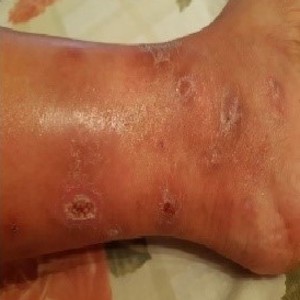Infliximab as successful treatment option in a case of adenosine deaminase 2 deficiency

Submitted: 19 December 2022
Accepted: 13 October 2023
Published: 19 December 2023
Accepted: 13 October 2023
Abstract Views: 1143
PDF: 321
Publisher's note
All claims expressed in this article are solely those of the authors and do not necessarily represent those of their affiliated organizations, or those of the publisher, the editors and the reviewers. Any product that may be evaluated in this article or claim that may be made by its manufacturer is not guaranteed or endorsed by the publisher.
All claims expressed in this article are solely those of the authors and do not necessarily represent those of their affiliated organizations, or those of the publisher, the editors and the reviewers. Any product that may be evaluated in this article or claim that may be made by its manufacturer is not guaranteed or endorsed by the publisher.
Similar Articles
- F. Ursini, TNF-alpha and insulin-resistance: metabolic effects of in vivo therapeutic blockade , Reumatismo: Vol. 61 No. 4 (2009)
- R. Herrera-Esparza, E. Avalos-Diaz, Infliximab treatment in a case of rheumatoid scleromalacia perforans , Reumatismo: Vol. 61 No. 3 (2009)
- R. Scrivo, F. Conti, F.R. Spinelli, S. Truglia, L. Magrini, M. Di Franco, F. Ceccarelli, G. Valesini, Switching between TNFα antagonists in rheumatoid arthritis: personal experience and review of the literature , Reumatismo: Vol. 61 No. 2 (2009)
- A.R. Giardina, A. Accardo-Palumbo, F. Ciccia, A. Ferrante, A. Principato, R. Impastato, G. Triolo, Blocking TNF in vitro with infliximab determines the inhibition of expansion and interferon gamma production of Vγ9/Vδ2 T lymphocytes from patients with active rheumatoid arthritis. A role in the susceptibility to tuberculosis? , Reumatismo: Vol. 61 No. 1 (2009)
- M. Fabris, L. Quartuccio, V. De Re, G. Pozzato, C. Mazzaro, A. Tavoni, C. Ferri, S. Salvin, A. Lerussi, C. Fabro, S. Bombardieri, S. De Vita, Fibronectin gene polymorphisms and clinical manifestations of mixed cryoglobulinemic syndrome: increased risk of lymphoma associated to MspI DD and HaeIII AA genotypes , Reumatismo: Vol. 60 No. 1 (2008)
- C. Botsios, P. Sfriso, A. Furlan, P. Ostuni, M. Biscaro, U. Fiocco, S. Todesco, L. Punzi, Anakinra, a recombinant human IL-1 receptor antagonist, in clinical practice. Outcome in 60 patients with severe rheumatoid arthritis , Reumatismo: Vol. 59 No. 1 (2007)
- L. Beretta, S. Astori, E. Ferrario, M. Caronni, M. Raimondi, R. Scorza, Determinants of depression in 111 italian patients with systemic sclerosis , Reumatismo: Vol. 58 No. 3 (2006)
- C. Botsios, P. Ostuni, P. Sfriso, A. Furlan, U. Fiocco, D. Sgarabotto, S. Todesco, Infections in patients with rheumatoid arthritis receiving anti-cytokine therapy: biological mechanisms and clinical aspects , Reumatismo: Vol. 55 No. 4 (2003)
You may also start an advanced similarity search for this article.

 https://doi.org/10.4081/reumatismo.2023.1543
https://doi.org/10.4081/reumatismo.2023.1543





